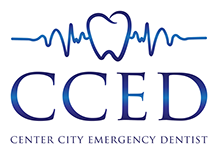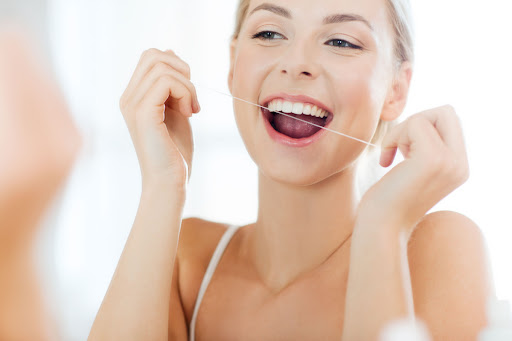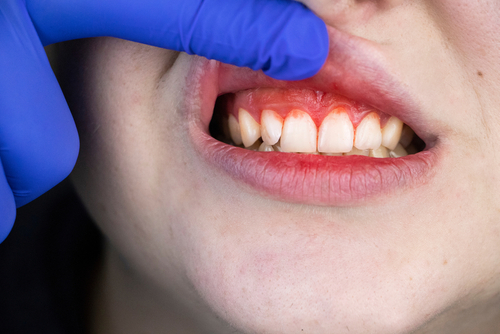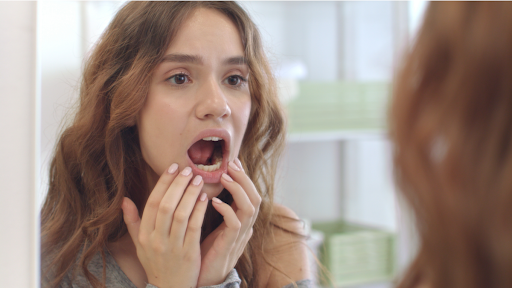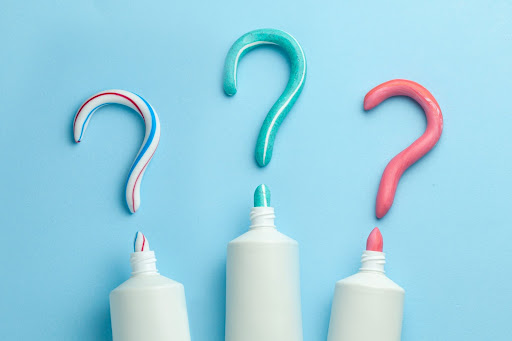Brushing your teeth is about more than just maintaining a bright and shiny smile — it’s an important part of preventative care for your mouth and, by extension, your overall health. Any built-up plaque can lead to gum diseases and infections. If you want to keep your teeth, gums, and tongue healthy, here’s a look at eight oral hygiene instruction steps.
Author: admin
What Is Gingivitis and How to Treat It
Have you noticed your gums become more soft and tender than usual? Are they painful to touch and sometimes bleed when brushing your teeth? These are both symptoms of gingivitis, a common oral disease that affects many. When left untreated, gingivitis can cause several problems that threaten your oral health, such as tooth loss. Thankfully, preventing and treating gingivitis is possible. To learn more, here’s what it is, what can cause it, and the treatments for it.
The Role of Biofilm in Oral Health
The mouth is a critical part of the human body. Because of how important your teeth, tongue, and other features are for your health, taking good care of them and the organisms that live there is important.
While the thought of living organisms making your mouth their home may sound unusual and unsanitary, it’s completely normal. However, despite the fact that every human has them, it doesn’t mean they won’t cause any problems. This collection of organisms, known as the biofilm, is incredibly influential to your oral health. Not paying attention to the biofilm in your mouth can cause numerous outcomes that can harm your teeth. For more information, here is an overview of the effects of biofilm on oral health, from what the biofilm is to how it can be maintained.
The Dangers of Grinding Your Teeth
If you commonly experience headaches and pain in your jaw after getting a good night’s rest, you might be a teeth grinder during your sleep. Bruxism is a disorder that affects 8% of the population and poses a significant threat to the long-term health of your teeth.
You don’t want to know that all those precious dental visits went to waste, so it’s good to learn about the effects of grinding your teeth and how important it is to avoid the dangers that may arise if you don’t stop grinding your teeth.
Why Do We Grind Our Teeth?
Bruxism can be a stress-related symptom or a side effect of medications, and every individual’s diagnosis depends on multiple factors. Each patient should consider the different reasons for teeth grinding and discuss which cause may apply to them with their dentist.
Stress and Anxiety
Clenching your muscles is a common human reaction when feeling stressed, and unfortunately for our oral health, clenching and grinding our teeth is another side effect. Grinding or clenching may be a response to daytime stressors like work, family, and finances, so consider how stress and anxiety impact you.
Medications
Conditions like depression and anxiety might force you to take medications that can leave you grinding or clenching your teeth. Amphetamines and antidepressants are known for causing nighttime grinding, so read up on the medicines you take for a clearer understanding of what could be causing your bruxism.
Abnormal Bite
Patients with abnormal bites commonly suffer from the effects of grinding teeth. If your upper and lower teeth don’t perfectly blend, you might promote teeth grinding and excessive clenching that damages the teeth and can lead to sleep bruxism.
Sleep Apnea
Sleep disorders like sleep apnea can lead to grinding teeth and clenching. About a quarter of all people with sleep apnea suffer from sleep bruxism. When the brain picks up that your airways and upper respiratory systems are stressed or disrupted, it sends signals to compress the throat, thereby promoting teeth grinding and clenching.
Signs and Symptoms of Bruxism
While you may not be sure if you’re grinding your teeth at night or not, there are a few ways you can identify if teeth grinding is an issue for you. A few signs and symptoms of bruxism include:
- Jaw pain
- Difficulty sleeping
- Sore jaw muscles
- Pain in teeth
- Broken teeth
- TMJ
Dangers of Teeth Grinding
There are many dangers to grinding teeth, including the increased risk of tooth damage and additional medical disorders that require more strenuous treatment methods. Teeth grinding wears away at your enamel, and you’ll eventually need crowns and dentures to address your dental problems.
TMJ is a disorder characterized by a popping or clicking noise in your jaw that is common due to wear and tear and excessive stress on the jaw. TMJ can be extremely painful, and its symptoms may be worsened by bruxism, which could lead to emergency oral surgery or other more painful and expensive treatment methods.
How Can I Prevent Nighttime Teeth Grinding?
Preventing nighttime teeth grinding can be taken with a few preventative measures and medications. Mouthguards can help protect your teeth from the friction from grinding teeth, and taking muscle relaxers can counter the compression of your muscles. Sleeping in a comfortable and cool room on your side also helps to reduce stress and avoid promoting excessive teeth grinding.
The best way to prevent nighttime teeth grinding is to get in touch with your local dentist to address and treat your symptoms. Reach out to Center City Emergency Dentist if you feel you have any symptoms of bruxism or if you’re in need of a dental implant dentist in Philadelphia.
Tips on Selecting the Best Toothpaste for You
Regularly brushing your teeth is vital for your dental health. However, there are so many different brands and types of toothpaste available on the market it can be challenging to know which one is right for you. To help make selecting toothpaste easier, let’s take a look at the main kinds and how they benefit your teeth.
Fluoridated Toothpaste
Many consider fluoride as the most important toothpaste ingredient. It has been proven to decrease tooth decay and reduce the prevalence of cavities since its discovery. This naturally-occurring mineral has been so beneficial for oral health that governments have added it to water supplies throughout several parts of the world, including the United States.
The reason why fluoride is so vital for proper oral hygiene is that it can help prevent the deterioration of tooth enamel. Enamel is calcified tissue that acts as a protective cover for teeth. Enamel is incapable of repairing damage on its own because it does not contain living cells. Fluoride helps combat decay by making enamel more resistant to acids and other substances that negatively affect tooth structure.
Tartar Control Toothpaste
If you’re choosing toothpaste for the sake of oral hygiene, consider purchasing toothpaste designed to control tartar. This variety of toothpaste utilizes chemical compounds or antibiotics to prevent the buildup of tartar, which is a hardened layer of bacteria called plaque. Some kinds of toothpaste also limit the growth of the hard deposits on the crowns and roots, known as calculus.
Whitening Toothpaste
Not all toothpaste whiten teeth; the varieties made to do so are specific teeth-whitening toothpastes. The abrasive particles added to these pastes help make teeth brighter by binding to the stains on your teeth and then pulling them off as you brush and rinse. While teeth-whitening toothpaste does not contain any dangerous additives like bleach, the chemicals responsible for removing stains, such as calcium peroxide and carbamide peroxide, can be harmful after long-term use or for those with sensitive teeth.
Toothpaste for Tooth Sensitivity
Individuals who have sensitive teeth should take that into consideration when choosing toothpaste. Toothpastes for tooth sensitivity can help prevent discomfort from acidic, cold, or sweet foods. Through chemicals like potassium nitrate or strontium chloride, tooth-sensitive toothpaste shields the nerve pathways of teeth.
Choosing a Toothpaste
Selecting the right toothpaste boils down to your personal preferences and needs, such as whether you have sensitive teeth or want to brighten your smile. While asking your dentist which types of toothpaste are best for you, there are some varieties you should steer clear of.
Those that do not have the seal of approval from the American Dental Association, or ADA, may have higher levels of chemicals that can harm your teeth. Additionally, be wary of Triclosan in tartar-control toothpaste; this antibiotic can also kill the good bacteria that help with digestion.
If you’re looking to receive dental implants in Philadelphia, PA, reach out to Center City Emergency Dentist. Our orthodontists located in Philadelphia can help correct crooked teeth, overbites, underbites, and other tooth misalignments. Call today and schedule an appointment!
The Effects of Vaping on Teeth
While high school students might believe that vaping devices are a safe and trendy alternative to cigarettes, the effects of vaping can also cause health problems. Some might be skeptical of how vaping can damage teeth, but it can damage far more. Although there may be lower nicotine levels in vaping liquids, the other chemicals present can create several other problems that traditional tobacco products can’t.
Here are the various ways that the effects of vaping can damage a vaper’s mouth.
Vaping Isn’t Free From Nicotine
The effects of nicotine are notorious for restricting blood flow to the gums, and while vaping liquid has less overall nicotine, it is still enough to cause significant harm. Decreased blood flow in the gums can cause a myriad of issues, such as reducing their ability to stave off infections. Additionally, lack of oxygen flow to the gums can cause them to recess. This detriment can increase the sensitivity of the teeth, which in turn increases the chances of problems like cavities. However, this is just one of the forms of damage caused by vaping.
Vape Contains Dangerous Chemicals
Propylene Glycol is a core ingredient in vaping liquid that’s absent in other tobacco-based products, and it can cause various problems for one’s mouth. After a vaper ingests Propylene Glycol, it breaks down into an acid that is toxic to soft tissue and tooth enamel. Given that cigarettes lack this chemical, this is one such way that the tooth damage caused by vaping is worse than other tobacco products.
Additionally, Propylene Glycol can reduce the amount of saliva in a vaper’s mouth and cause dry mouth. Teenagers usually have higher saliva quantities than older adults but have begun to develop dry-mouth-related diseases, such as periodontal disease, because of vaping. Further, dry mouth can also cause plaque buildup, tooth decay, and other tooth damages caused by vaping.
Another dangerous chemical found in vape liquid is vegetable glycerin, which is used as a sweetener. Even if the sweetener tastes good to vapers, their mouths won’t appreciate the damaging effects it has. After inhaling a vape, the sweetener can help bacteria stick to their teeth and increase the chances of an infection.
Vaping Can Cause Tremendous Damage to More Than Your Teeth
When all of the aforementioned chemicals combine in a vaper’s mouth, the results can be disastrous. The inflammation caused by the nicotine exposure, increased bacteria, and dry mouth all work together to make an individual’s mouth more susceptible to gum disease, which hurts more than just their teeth. Other potential tooth damages caused by vaping include oral infections and oral cancer, which can be deadly if not addressed early on in their progression.
Additionally, the lithium batteries in certain e-cigarettes have exploded in the past. Though the likelihood of such an event occurring is low, vape explosions can cause considerable damage in a victim’s mouth if they were vaping when the battery exploded.
If you need the assistance of an emergency dental surgeon or same-day dental implants in Philadelphia, contact Center City Emergency Dentist today!
